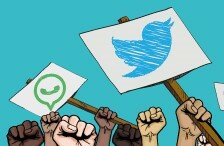The Relationship Between Gender And Digital Politics
As someone who is aware of the ranging expanse that is gender identity, it feels right to ponder over the correlation between gender and digital politics and the wider impact of this correlation. I aim to give potential suggestions as to why gender plays a role, and alternatively acts as a barrier in the world of politics, with a focus specifically on the digital side of politics. I’m sure you’re expecting this by now but as always, the disclaimer, these are just my opinions and politics is just opinions anyway.
The digital divide refers to the difference in access to technology between groups of people and I’ll be discussing this in relation to gender. The difference between men having access to internet and women having the same access is as high as 32.9% and this leads to varying consequences. The lack of access women have to the internet and therefore digital politics reinforces the idea that women should be excluded from these digital spaces, culminating into a cycle of voicelessness for women. If women were given the same opportunity as men it would allow for women led strives for equality to flourish, especially with a focus on this importance for WOC. The necessity of this empowerment cannot be overstressed.
It is also important to highlight digital inequalities faced by gender diverse people. I choose to use they/them pronouns for a multitude of reasons and while I’m lucky enough to have had overwhelmingly positive interactions regarding this, within digital political spaces being tokenised due to using different pronouns than the ones expected of me. Gender diverse people are often expected to spoon feed information to people without any form of compensation for the effort this takes or any consideration for how taxing this can be, especially as trauma is frequently intertwined with their identity. While this education is so important, it shouldn’t be at the expense of gender diverse people who are already excluded and disenfranchised in digital political spaces, meaning that it is cis people that need to put in considerably more effort to engage while knowing their place.
Furthermore, digital literacy has become just as important as traditional literacy and it is estimated that 90% of jobs now have a digital aspect to them, showing how important a space for all genders within digital politics is. Moreover, with an added awareness of digital political spaces- these women can provide an expanse of economic prosperity with their skills. Now don’t get me wrong, I’m still an anti-capitalist and it’s obvious that the value of these lies outside how economically productive they are, I just wanted to highlight how much of an impact digital literacy can have for women.
This clearly shows how the correlation between gender and digital politics translates to the offline world. Furthermore, it should be noted that often in conversations about where women are involved that the voices of gender diverse people often get silenced, and this is yet another issue that must be solved. However, I would like to make it clear that I am not aiming to create a divide between women and gender non- conforming people, I just want to highlight these disparities both communities face in comparison to men. If anything, wide-ranging cross-community support and intersectionality is the only way these issues can be overcome. To summarise, I’ve offered up a few suggestions as to why this correlation is so poignant especially in a world that is so digitally focussed but as we all know by now these are just my opinions, and I’m certain that many other people have far more developed opinions than mine. But as always, politics is just opinions anyway.


